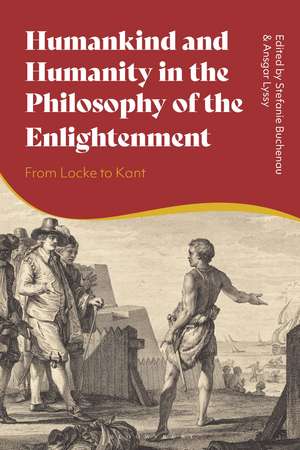Humankind and Humanity in the Philosophy of the Enlightenment: From Locke to Kant
Editat de Dr Stefanie Buchenau, Dr Ansgar Lyssyen Limba Engleză Hardback – 20 sep 2023
Preț: 511.40 lei
Preț vechi: 731.78 lei
-30% Nou
Puncte Express: 767
Preț estimativ în valută:
97.89€ • 106.36$ • 82.28£
97.89€ • 106.36$ • 82.28£
Carte tipărită la comandă
Livrare economică 21 aprilie-05 mai
Livrare express 15-21 martie pentru 120.55 lei
Preluare comenzi: 021 569.72.76
Specificații
ISBN-13: 9781350142930
ISBN-10: 135014293X
Pagini: 280
Dimensiuni: 156 x 234 x 25 mm
Greutate: 0.56 kg
Editura: Bloomsbury Publishing
Colecția Bloomsbury Academic
Locul publicării:London, United Kingdom
ISBN-10: 135014293X
Pagini: 280
Dimensiuni: 156 x 234 x 25 mm
Greutate: 0.56 kg
Editura: Bloomsbury Publishing
Colecția Bloomsbury Academic
Locul publicării:London, United Kingdom
Caracteristici
Demonstrates a very broad scope, covering all the major Enlightenment figures such as Montesquieu, Rousseau, Hume, Kant, Herder, Diderot, Johann Friedrich Blumenbach, Joseph Priestley and Samuel von Pufendorf
Notă biografică
Stefanie Buchenau is Professor of German and European History of Ideas at the University Paris 8 Saint-Denis, France. Ansgar Lyssy currently holds a fixed-term position as a philosophy professor at the University of Leipzig, Germany.
Cuprins
Introduction, Stefanie Buchenau (University Paris 8 Saint-Denis, France) and Ansgar Lyssy (University of Leipzig, Germany) 1. The Presumptive Unity of Humankind in Locke's Essay, Philippe Hamou (Sorbonne University, France)2. Human Nature in Montesquieu, Céline Spector ((Sorbonne University, France)3. The Image of the Human Being in the Comte de Buffon, Catherine Wilson (York University, UK)4. Hume on Humanity and the Party of Humankind, Jacqueline Taylor (University of San Francisco, USA)5. Humankind and Humanity in Diderot, Ansgar Lyssy (University of Leipzig, Germany)6. 'How do Humans become Human(e)?' On Rousseau's Second Discourse and Émile, Gabrielle Radica (University of Lille, France)7. 'In the human kind, the species has a progress as well as the individual': Adam Ferguson on the progress of mankind, Norbert Waszek (Université de Paris 8 - St. Denis, France) and Eveline Hauck (State University of Campinas, Brazil)8. The Association of Science and Civilization in the Enlightenment, Stephen Gaukroger (University of Sydney, Australia)9. Philoctetes at the Edge of Humanity: The German Enlightenment on Social Exclusion and the Education of Feeling, Stefanie Buchenau (University Paris 8 Saint-Denis, France)10. Enlightenment Moral Philosophy and Moral Psychology: Baumgarten, Kant, and Herder on Moral Feeling(s) and Obligation', Nigel DeSouza (University of Ottawa, Canada)11. Herder on Humanity, Michael Forster (University of Chicago, USA)12. Blumenbach on the Varieties of the Human Species, François Duchesneau (University of Montreal, Canada)13. Can Kant's 'Man' be a Woman?, Charlotte Morel (CNRS / ENS Paris, France)14. 'Anthroponomy'. Kant on the Natural and the Rational Human Being, Günter Zöller (Ludwig Maximilian University of Munich, Germany)Index
Recenzii
The "human sciences" were one of the great initiatives of the European Enlightenment, and perhaps one of its foremost achievements. In this collection, an excellent group of scholars traces out through the greatest thinkers of that age the new philosophical and empirical investigation of the biological nature and cultural history of humankind.
Kant famously stated that "out of the crooked timber of humanity nothing entirely straight can be made." But this certainly hasn't prevented Stefanie Buchenau and Ansgar Lyssy from putting together an outstanding collection of new essays on Enlightenment views about the multiple and complex dimensions of humanity and humankind.
Kant famously stated that "out of the crooked timber of humanity nothing entirely straight can be made." But this certainly hasn't prevented Stefanie Buchenau and Ansgar Lyssy from putting together an outstanding collection of new essays on Enlightenment views about the multiple and complex dimensions of humanity and humankind.
